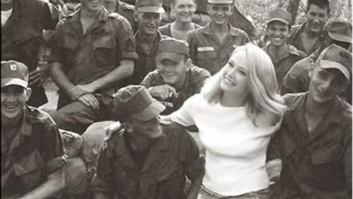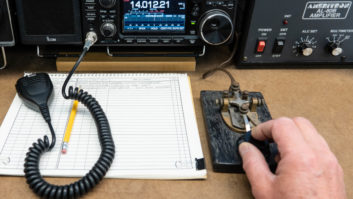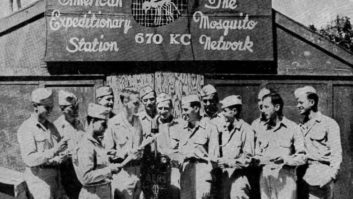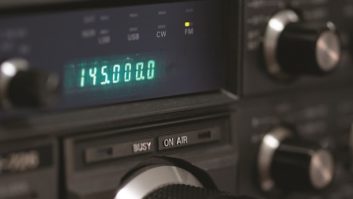At first you think you’ve been dropped off “at the end of the earth.” Then the blast of hot air hits you as you exit the plane.
This is 1968 — and this is war in Vietnam.
The first shock I remember was the rockets coming in at 3 a.m. to our holding station at Long Binh. We were told to roll out of our bunks and pull our bedding on top of us for protection.

That’s me at AFVN radio headquarters in Saigon in 1968 … After a couple days at Long Binh, I was assigned to the Armed Forces Vietnam Network headquarters in Saigon. AFVN was a complex of radio and TV stations in the heart of the city. The U.S. government had built and equipped an identical broadcast center for the Vietnamese right next door to our building.
I arrived at the station a couple days after the infamous Tet offensive. Every soldier was on high alert. The Vietcong had set off a car bomb in front of the building, blowing out the station’s windows. Luckily, the bomb went off in the middle of the night and no one was injured.
I remember walking into the lobby and seeing large pieces of glass embedded in the wall opposite of where the windows used to be. Clearly, this was going to be a broadcast “experience” unlike any I had previously.
‘Town and Country’
I had started in radio in junior high school working at WAIK in my hometown of Galesburg, Ill. Eventually I moved to WGIL in Galesburg during high school, and, later, during breaks from college at the University of Illinois in Champaign. There, during my senior year, I started as a weatherman, game show host, and booth announcer at WCIA(TV), Channel 3, a CBS affiliate.
With the Vietnam War in progress, I enlisted in the Army after college graduation, in hopes of having some say in what I was going to do in the service. Most everyone in the Army knew they would eventually serve in Vietnam.
AFVN had personnel from many branches of the service. Radio-wise, it consisted of a Saigon FM station and a master AM control that fed programming to various Armed Forces stations located up and down South Vietnam. Each of these stations had its own staff and programming, but was required to take certain programs from the network headquarters in Saigon.
I was assigned an afternoon air shift on the FM station, and an evening two-hour country music program on the network feed to all the stations in Vietnam.
My evening program was called “Town and Country.” I started out including 15 minutes of listener requests, but eventually devoted a full hour to requests, as I quickly began to get so many. I got mail from personnel throughout Vietnam, as well as from Navy men at sea. Guys requested songs dedicated to their wives or girl friends or family members. I also received many requests from Vietnamese listeners who liked American country music.
One of the thrills for me was hearing from a college friend, Mark Krueger. Neither of us knew the other was in Vietnam.
Mark remarked later, “I was serving in an artillery unit in the field when one evening I turned on my portable radio. As I recall, it was a country music show. And darned if I didn’t recognize the voice on the air as that of Rick Bednar. I’d gone to college with him back in Champaign. I was never really fond of country music but I was so happy to hear a familiar ‘voice from home’ that I listened to that show each evening from then on.”
Belated wishes
At AFVN, we had an excellent staff and top-notch equipment. Nothing was “too good for the troops.” If we needed a new cart deck, for example, the Pentagon sent two. Our staff included many talented news reporters who went on to stateside network news operations after their military service.
I worked with the late Gary Gears, who had previously been a DJ on WLS and WCFL in Chicago, and, later, went on to a prominent commercial voice-over career. Our “most famous” AFVN on-air personality was a great guy and our “Good Morning Vietnam!” morning show host. He was Pat Sajak, who would go on to host “Wheel of Fortune.”
People sometimes ask me if the Robin Williams movie “Good Morning Vietnam” is true to life. I enjoyed the movie but feel it was primarily a stage for Williams’ considerable ad-lib comedy skills. At the “real-life” AFVN, we never had the freedom to “tweak the military brass” or the U.S. government like Williams did in the movie.
Like hundreds of other Armed Forces broadcasting personnel serving around the world, our job was to entertain and inform the troops and help boost morale.

…and today, in my home recording studio. We were proud to bring a “voice from home” to those in the field whom we all admired very much. They were the heroes of the war, in our eyes.
Today, I’ve retired from WCIA(TV) and enjoy running my recording studio specializing in radio commercial production and television voice-overs.
But I often reflect on my Vietnam experiences. We were in the middle of a war, yet I think most service personnel there were able to keep their sense of humor.
Sorry Mr. President
Pat Sajak recently told me about a humorous experience he had while hosting his AFVN morning show, “President Nixon was scheduled to deliver a Christmas television address to the nation in 1969, and, due to the time difference (and the fact that satellite technology was in its infancy), we were carrying it only on radio during my morning show,” Sajak recalled.
“I was playing music as usual, but monitoring the CBS network in one ear. When I heard the president being introduced, I broke in to my music and said, ‘And now the president of the United States.’ I flipped a switch, and the speech could be heard throughout Vietnam.
“Nixon came to a moving conclusion, and there was silence as he began shuffling his papers. I flipped the switch again and resumed my show,” Sajak continued.
“A few seconds later, I was horrified to hear through that same ear that he had resumed speaking. Not only that, he was sending Christmas greetings directly to the troops in Vietnam, who were listening instead to the 1910 Fruitgum Company’s rendition of ‘1, 2, 3 Red Light.’
“I could have admitted my mistake and gone back to the speech, but I figured there was no point in doing that because I was the only one in the world who knew that Richard Nixon was directing his comments to only one soldier: me!
“So if you were in Vietnam at Christmastime in 1969, allow me to wish you a belated Merry Christmas from Richard M. Nixon!”
The author owns and operates a recording studio in Champaign, Ill., specializing in radio and television voice overs and spot production. He is retired from WCIA(TV) in Champaign where he had a 42 year career as a writer/producer, television weatherman and announcer. Contact him at[email protected].











